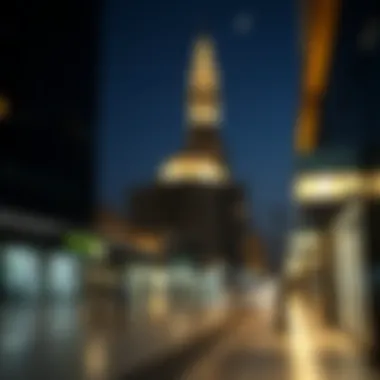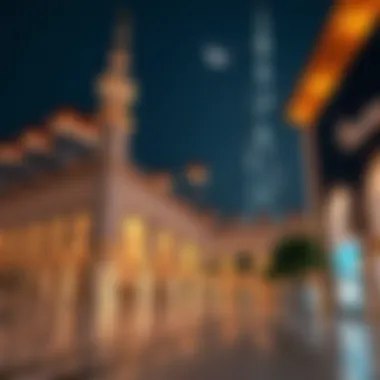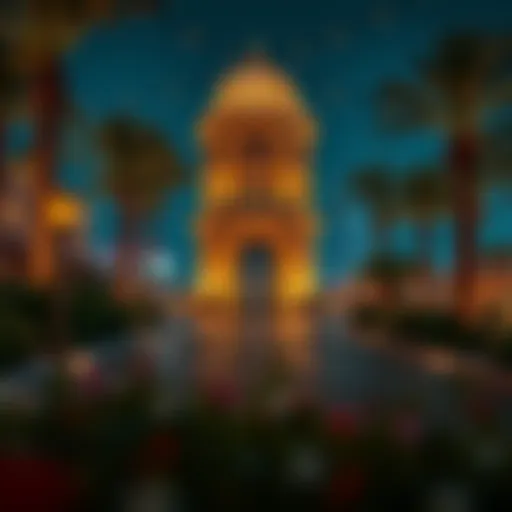Dubai Ramadan Schedule: Impact on Life and Business


Intro
Ramadan, a month of fasting and reflection, is not just a significant period in the Islamic calendar, but it also transforms the way of life in Dubai. For countless residents and businesses, Ramadan symbolizes a chance to reset, think about values, and restructure daily habits. Amid the glimmering skyscrapers and bustling souks of this vibrant emirate, life takes on a different rhythm. This shift affects everything from work schedules to social engagements, and even extends into real estate activities.
The dynamic nature of Dubai's economy coupled with its rich cultural mosaic makes it imperative for both locals and visitors to grasp the basics of the Ramadan schedule. A well-informed approach allows individuals to navigate the complexities of day-to-day activities seamlessly. With this in mind, let's delve deeper into how the holy month influences life and commerce in this bustling city, and what it means for those who are looking to either settle down or invest in the market.
The Significance of Ramadan in Dubai
Ramadan carries profound significance in Dubai, underscoring the intertwining of faith, social values, and community spirit. This holy month is not merely a period of fasting; it is a comprehensive experience that heavily influences daily life and the business landscape throughout the city.
Cultural Importance
At its core, Ramadan represents a time for reflection and community. It’s when you see families coming together, sharing meals, and engaging in acts of charity. The cultural tapestry of Dubai shines brightly during this month. For residents and visitors alike, it’s a rich blend of traditions and new practices. Nightly prayers, known as Tarawih, pulsate through the city as mosques fill with people seeking spiritual connection.
Beyond spirituality, Ramadan enhances cultural awareness. Events and gatherings encourage inclusiveness, allowing people from diverse backgrounds to partake in Iftar meals. This solidarity fosters a sense of belonging and understanding across different cultures and religions. In a bustling metropolis such as Dubai, marked by its multicultural identity, this is crucial. Ramadan encourages a gentle pause, inviting everyone to engage more deeply with their communities.
Historical Context
Understanding the historical context of Ramadan provides a rich backdrop for its significance in Dubai. The observance of Ramadan has been part of Islamic tradition since its inception in the 7th century. Over time, the significance of this month has evolved, but some elements remain steadfast. In Dubai, the practice of fasting dates back centuries, deeply entrenched in the Bedouin culture and later embodied by the emirate's Islamic governance. Historical texts often depict Ramadan as a time of cultural gatherings, reinforcing family bonds and community cohesion.
The rapid evolution of Dubai from a humble fishing village into a global city has not overshadowed these historical roots. In fact, they have become more pronounced, with historical sites gaining renewed attention during Ramadan. Many individuals take this opportunity to reconnect with their heritage, often visiting places such as the Dubai Museum or the Al Fahidi Historical Neighborhood, which tell the story of the incredible transformation Dubai has undergone while still honoring its past.
Spiritual Observances
The spiritual observances during Ramadan extend beyond simple adherence to fasting. Fasting serves as a means of developing self-discipline, compassion, and empathy for those less fortunate. This month encourages deeper personal reflection and fosters spiritual growth through prayer and community involvement.
Fasting persists from dawn to sunset, teaching patience and self-restraint. Suhoor, the pre-dawn meal, is not just about food; it symbolizes preparation for a day of devotion. Iftar, where families and friends gather to break the fast, is a joyous communal affair, often featuring sweet delicacies like dates and traditional dishes. The call to prayer, known as Adhan, brings with it a wave of serenity each evening as families come together, underscoring the significance of togetherness.
“Through spiritual practices, Ramadan nurtures a collective identity that resonates deeply within the community.”
Both locals and expatriates get an opportunity to engage in various charitable activities, embodying the month’s emphasis on generosity. Those who fast are also encouraged to feel for others in the community, further enriching the social fabric that holds Dubai together.
In essence, Ramadan serves as a reminder of the values of empathy, community, and spirituality—elements that are crucial to the identity of Dubai. As it embeds itself in the rhythm of daily life, it leaves a lasting impact well beyond the holy month.
Understanding the Ramadan Schedule in Dubai
The Ramadan schedule in Dubai holds significant sway over the daily routines of residents and the operation of businesses. Recognizing this schedule not only enhances one's understanding of the culture but also aids in navigating the daily nuances of life during this holy month. The specific timings associated with fasting, especially Suhoor and Iftar, guide the daily practices of individuals and families, thus informing how they structure their day ahead.
Timing of Fasting
Suhoor Timing
Suhoor is the pre-dawn meal that marks the beginning of fasting. The timing is crucial, as it sets the pace for the upcoming day. Typically, Suhoor needs to be consumed before the first light of dawn, making early wake-up calls a routine for many. This meal is more than just sustenance; it's a communal experience. Families often gather around the table, strengthening bonds while indulging in various dishes, from traditional favorites like foul and hummus to more contemporary options.
The key characteristic of Suhoor is its role in providing energy for the day ahead. A well-planned Suhoor reflects the culinary richness of the region and emphasizes the importance of nutrition when fasting. However, consuming heavy, greasy foods may lead to discomfort when fasting just hours later. Therefore, balancing choices is beneficial; opting for hydration-heavy fruits and whole grains can be advantageous.
Iftar Timing
Iftar, the meal to break the fast at sunset, is another pivotal aspect of Ramadan. It typically occurs right after the Adhan, or call to prayer, which signals the end of the day's fast. This moment is celebrated dynamically, as families and friends come together to share the bounty of their meals. The unique feature of Iftar means not just ending the fast but is also an opportunity to reconnect with loved ones over a table laden with dates, water, and nurturing dishes.
Iftar timings can come as a relief and often serve as a reminder that, amidst the day’s challenges, community and connection are central themes. However, public places often become crowded, and reservations are recommended, particularly in popular restaurants. Adapting to the rush and making dining plans in advance can help mitigate the potential stress of last-minute decisions.
Ramadan Calendar Overview
The Ramadan calendar offers a structured timeline for Muslims, detailing the start and end of this sacred month based on lunar observations. Each day brings its unique significance, with some days holding particular spiritual weight due to their association with historical events or practices. Consequently, individuals might engage in additional prayers or reading of the Qur'an during these key periods.
Integrating such practices into daily life not only enriches one's spiritual experience but also reinforces community bonds through shared observances. Moreover, understanding the calendar is crucial for employers and businesses to align their operating hours and activities with the expectations of their clientele.
Variations in Timings
Geographical Differences


Across Dubai, slight geographical differences can impact the actual timing of Suhoor and Iftar. Locations closer to the coast may experience a marginally later call to prayer than areas situated further inland. These variations highlight the need for individuals to stay informed about local prayer times as not everyone shares the same experience of the fasting hours.
This diversity has its advantages, offering a more localized practice within Dubai. Additionally, it contributes to the city's reputation for cultural richness, providing opportunities for different communities to celebrate their practices within the broader Islamic framework. However, being off by minutes can lead to an awkward disruption, making reliable resources for prayer times essential.
Change Over the Month
As Ramadan progresses, the timings for Suhoor and Iftar will shift due to changes in daylight hours. Early in Ramadan, the fasts tend to be shorter with dawn occurring later. Conversely, as the month draws to a close, individuals may find themselves fasting for longer stretches. This unique feature presents both challenges and benefits; on one hand, it tests resolve and patience, but on the other, it nurtures a deeper understanding of endurance and gratitude.
This gradual change can help build one's capacity for fasting, making the concluding days a more profound experience. Likewise, it prompts conversations about personal and shared experiences, emphasizing the community aspect inherent in Ramadan. Such transitions within the month should be closely monitored, allowing for both adjustments in personal schedules and business operations.
By grasping the intricacies of the Ramadan schedule, one not only enhances their daily life and business practices but also gains a deeper appreciation for the rich cultural tapestry that is woven into the fabric of Dubai during this holy month.
Daily Life Adjustments During Ramadan
During Ramadan, the holy month of fasting and spiritual reflection, daily life in Dubai experiences significant transformations. Understanding these adjustments is vital for anyone residing in or visiting the city during this period. From work hours to school schedules and public transport, the changes not only shape individual routines but also impact the broader economic environment.
Altered Work Hours
Government Guidelines
The Dubai government implements specific guidelines to accommodate the fasting community during Ramadan. Typically, the work hours for public sector employees are reduced to six hours a day. This adjustment is made to allow civil servants to engage in spiritual activities and is well-received by the workforce. It's a commendable step that balances employment needs with cultural practices.
One unique feature of these guidelines is their flexibility. While the standard reduction is to six hours, certain departments may have varied timings based on their operational needs. This allows for a tailored approach, ensuring that essential services still function effectively. The primary benefits of these government guidelines are that they promote well-being and respect for the month, thus fostering a harmonious environment that boosts employee morale.
Private Sector Adaptations
In the private sector, businesses in Dubai are also modifying their operating hours during Ramadan, but with more variability compared to government institutions. Many companies choose to follow a shortened workday, although some may maintain normal hours depending on their industry and workflow. This adaptation is essential, as it reflects the corporate culture of flexibility and responsiveness to employee needs during this significant month.
The choice to adjust work hours often includes a staggered schedule, where teams may rotate shifts to ensure business continuity. This flexibility can provide significant advantages, such as maintaining productivity while still considering the needs of fasting employees. However, it does come with challenges, particularly for industries reliant on client-facing roles or strict deadlines.
Impact on Public Transport
Public transport in Dubai also undergoes significant changes during Ramadan. As many people are involved in fasting, the travel patterns shift considerably. The peak hours for public transport often change, as individuals prefer to travel before Suhoor or just before Iftar.
This change can lead to crowded buses and metro systems around Iftar time. For transport authorities, it becomes important to optimize schedules to accommodate these shifts. Often, additional services or extended timings are put in place to cater to the increased demand.
School Schedules
The education system in Dubai is not exempt from the influences of Ramadan. Schools typically adapt their schedules to fit the rhythm of the holy month. Many institutions opt for shortened school days, allowing students time to rest and engage in Ramadan activities.
Teachers may also incorporate lessons on cultural understanding and religious significance, enriching students’ awareness during this period. This holistic approach ensures that students remain engaged while also respecting the traditions of Ramadan.
Business Operations During Ramadan
During Ramadan, the business landscape in Dubai transforms significantly. Understanding these adjustments is crucial not only for locals but also for expatriates and visitors who might be unaware of the cultural and operational shifts that take place during this holy month. The alterations in business practices can affect everything from retail operations to customer relations, marking a crucial intersection between commerce and culture.
Adjustments in Retail Hours
Retail hours see a notable shift during Ramadan, tailored to accommodate the fasting schedule. Shops often open later in the morning and close later in the evening, allowing customers to shop after iftar. For instance, you can expect shopping malls like The Dubai Mall and Mall of the Emirates to remain open until midnight or even later. This adjustment aims to maximize the shopping experience for those looking to enjoy post-iftar activities.
"Retailers adapt their timing to cater to the community's needs, ensuring that every shopper’s experience is enjoyable and respectful of the spirit of Ramadan."
Changes in Customer Interaction
Customer interaction also evolves during Ramadan. Many businesses encourage their staff to showcase cultural sensitivity, greeting customers warmly while acknowledging the significance of the month. Additionally, promotional campaigns shift focus, featuring special Ramadan offers that resonate with the spirit of giving.
Moreover, businesses often create iftar deals designed for customers who gather together to break their fast, enhancing community bonding through shared experiences. Engaging with customers in this meaningful way is paramount, as it helps strengthen customer relationships and enhance brand loyalty during this time.
Impact on Real Estate Transactions
Real estate transactions during Ramadan feature unique dynamics, influenced by the month's observances and how they align with buyer motivations.
Market Activity


The market activity tends to slow down as many potential buyers and sellers are focused on their religious duties. However, this can also create opportunities for serious buyers to negotiate better deals, as the competition may dwindle. Potential investors often use this time to explore the market more leisurely, seizing opportunities that would be otherwise overshadowed during busier months. Notably, properties that integrate Islamic design principles or are located near mosques may see more interest.
Buyer's Perspective
From the buyer's perspective, it’s essential to approach the market with an understanding of the seasonal factors at play. Ramadan can bring a pause in rash decision-making, allowing buyers to reflect more on their choices. Clients often want to find homes that are not just a roof over their heads, but fit their lifestyle as families prepare for celebrations such as Eid. The value of community amenities like parks or proximity to places of worship becomes notably more significant during this time. Buyers may also seek properties ready to welcome family gatherings during iftar, emphasizing the importance of space and communal areas.
Both market activity and buyer's perspective during Ramadan underline the importance of a nuanced approach when navigating transactions. The convergence of time for reflection and cultural consideration creates a unique landscape for real estate in Dubai.
Cultural Activities and Events in Ramadan
Cultural activities and events during Ramadan play a central role in enhancing the communal and spiritual spirit of the month. They offer not only a platform for the community to come together but also reinforce traditional values and practices that define Emirati culture. The vibrancy of these activities provides a showcase of what makes living in Dubai both unique and enriching, particularly for those who are experiencing this holy month for the first time.
Community Events
Community events in Dubai during Ramadan are numerous and varied. They range from local iftar dinners hosted in mosques to large-scale festivals organized by municipalities or community groups. These gatherings foster a sense of belonging and solidarity among participants. In many cases, families and friends gather to break their fasts together, sharing meals that might feature traditional dishes such as harees and qamar al-din.
"In Dubai, Ramadan is not just about individual fasting; it's about collective experiences that bind the community closer."
These community events often extend their reach to non-Muslims, promoting understanding and respect across cultures. Many community leaders emphasize participation in such events, emphasizing inclusivity, which is a vital aspect of Emirati culture.
Support for these gatherings also comes from local businesses, which often sponsor iftar meals, helping to strengthen ties between commerce and the community. This involvement can be especially beneficial from a business perspective, as it allows companies to showcase their commitment to community welfare while aligning their brand with the values of Ramadan.
Iftar Gatherings
Iftar gatherings are one of the most anticipated aspects of Ramadan. These events can range from intimate family gatherings to large communal feasts in public spaces. Such gatherings provide a moment of pause, where individuals break their fast with dates, water, and a hearty meal afterward. Hotels and restaurants often offer special iftar menus during this time, catering to both local residents and visitors.
Tourists, in particular, may find iftar gatherings a delightful way to experience Emirati hospitality. Many venues also arrange entertainment or cultural presentations, allowing guests to immerse themselves in local customs. This dual experience of sharing a meal while enjoying cultural performances can create long-lasting memories for both locals and tourists alike. This nurtures a sense of connection and appreciation, turning everyday dining into a cherished experience.
Night Markets and Festivals
While Ramadan is a month primarily focused on fasting and reflection, it also brings a lively atmosphere during the evenings. Night markets and festivals pop up around the city, showcasing unique artisanal products, food stalls, and cultural performances. The fragrance of grilled meat, sweet desserts, and traditional drinks fills the air, tempting visitors and residents alike to explore these vibrant markets.
One popular venue during Ramadan is the Ramadan Night Market, which features a variety of local crafts, fashion items, and culinary delights from the region. These markets provide a perfect opportunity for small businesses to flourish, as they cater to the increased foot traffic and community engagement that the season brings. Additionally, these events celebrate local artistry, providing a platform for Emirati artisans to showcase their work.
In summary, the cultural activities and events during Ramadan in Dubai serve a dual purpose: they facilitate community bonding and enhance cultural awareness among diverse groups of people.
Engaging in such events allows individuals to appreciate the significance of Ramadan beyond fasting, highlighting the values of charity, compassion, and the celebration of togetherness prescribed by this holy month. As such, they are an important component that informs the broader social fabric of life in Dubai during Ramadan.
Navigating the Ramadan Experience as a Visitor
Understanding the dynamics of Ramadan in Dubai is essential for anyone planning to visit during this holy month. As a unique blend of culture and spirituality, Ramadan offers an enriching experience that extends beyond just fasting. For visitors, it presents a multitude of opportunities to engage with local traditions while being mindful of the customs observed during this significant period. Adapting to the Ramadan schedule can enhance the overall experience, allowing tourists to connect on a deeper level with the local community.
Cultural Sensitivity for Non-Muslims
It's crucial for non-Muslims to approach Ramadan with respect and consideration. Dubai is a melting pot of cultures, and during this month, the atmosphere shifts markedly. Visitors should be aware that many Muslims will fast from dawn until sunset, and this practice shapes the daily routines of everyone in the city. Observing respectful behavior is key. For instance, eating, drinking, or smoking in public during daylight hours can be seen as disrespectful. To navigate this, visitors might opt for private spaces or designated areas, like their hotel rooms, to indulge in meals or drinks.
Additionally, understanding the spirit of Ramadan can significantly enrich the visit. Engaging with locals about their traditions and practices can lead to meaningful conversations and connections. Visitors should remain open and curious about the customs they witness, such as breaking the fast at sunset, known as Iftar, which is often a communal event filled with joy and togetherness.
Iftar Experiences for Tourists
Iftar is not just a meal; it's a cherished ritual that brings people together. For tourists, experiencing Iftar in Dubai is a must. Numerous hotels, restaurants, and community centers host elaborate Iftar banquets. This is an excellent opportunity to taste traditional Emirati dishes alongside international cuisines.
Opting for an Iftar buffet allows visitors not just to fill their plates but also to soak in the ambiance—often filled with enchanting lanterns and festive decorations. Choices range from high-end hotel offerings to local eateries serving authentic cuisine. Some popular spots that serve Iftar include the Burj Al Arab and the Medina Jumeirah, renowned for their lavish spreads. Taking part in these gatherings can provide visitors insight into the importance of community during Ramadan as well as unique culinary delights.
Exploring Religious Sites
One cannot comprehend Dubai’s rich traditions without exploring its religious sites during Ramadan. Mosques welcome visitors for tours, offering a glimpse into the architectural beauty and cultural significance of these sacred spaces. The Grand Mosque and Jumeirah Mosque are popular choices among tourists, noted for their stunning designs and welcoming atmosphere. Guided tours often include an overview of Islamic practices and beliefs, fostering greater appreciation and understanding of the faith.
While visiting mosques, it's vital to abide by etiquette—wearing appropriate attire and maintaining a respectful demeanor is crucial. Ramadan open house events also occur at various mosques, allowing visitors to break bread with Muslim families and understand their traditions firsthand. This can transform a simple visit into a profound experience, bridging cultural gaps through shared moments.
Tourists venturing into Dubai during Ramadan should find the experience both enlightening and enjoyable. By practicing cultural sensitivity, participating in local traditions, and exploring religious sites, visitors can truly navigate and appreciate the Ramadan experience.
The Health Aspects of Fasting During Ramadan


Fasting during Ramadan goes beyond mere abstention from food and drink; it is a transformative period that can significantly affect both physical and mental health. Understanding the health aspects of fasting is crucial for anyone navigating this holy month, especially for residents and visitors who may not be familiar with the practices involved. During this time, the effects of fasting can resonate through daily life, impacting energy levels, dietary habits, and overall wellness. Fasting is not just a spiritual exercise; it is an opportunity for self-reflection, discipline, and health awareness.
Benefits of Fasting
The benefits of fasting during Ramadan can be multifaceted. Here are some key health advantages that are often highlighted:
- Detoxification: Fasting allows for the body to cleanse itself, as it reduces the intake of toxins that come from food and beverages. This detoxification process can lead to clearer skin and increased vitality.
- Weight Management: Engaging in fasting can instigate a change in eating patterns that might help with weight loss. Reduced caloric intake – when done mindfully – often leads to lower body mass index (BMI) over time.
- Improved Metabolism: Interestingly, fasting helps improve your metabolic rate. When the body is in a fasting state, it is thought to enhance fat burning, leading to better energy utilization.
- Mental Clarity and Focus: Many individuals report heightened clarity and focus during Ramadan. This may stem from having a consistent routine and spending more time on prayer and reflection, both of which contribute to mental well-being.
"Fasting is not an exercise in starvation, but a chance to cultivate mindfulness and health."
Potential Health Risks
Alongside the benefits, there are potential health risks associated with fasting that should not be overlooked. Each individual’s body responds differently, and here are a few considerations:
- Dehydration: With the restrictions on fluid intake from dawn to dusk, dehydration can quickly become a concern. In arid climates like Dubai, it is particularly important to ensure sufficient hydration during non-fasting hours.
- Nutrient Deficiency: If not planned carefully, fasting can lead to deficiencies in essential nutrients. A lack of variety in the diet can prevent the body from receiving necessary vitamins and minerals.
- Fatigue and Dizziness: Many individuals may experience fatigue or dizziness, especially in the initial days of fasting. A sudden change in routine can take a toll, particularly for those who haven’t fasted before or who are not accustomed to this shift in eating patterns.
- Gastric Problems: Some may face gastrointestinal issues as the digestive system readjusts to regular meal times after a prolonged fasting period. These issues can include indigestion, heartburn, or upset stomach.
Healthy Eating Tips
To maximize the benefits of fasting while minimizing risks, adopting healthy eating habits becomes essential. Consider these tips to stay healthy during Ramadan:
- Pre-Dawn Meal (Suhoor): Make it a priority to have a nutritious Suhoor meal, focusing on whole grains, protein, and plenty of vegetables. Avoid sugars and processed foods that might lead to a sugar crash.
- Hydration: During Iftar, prioritize water intake over sugary or caffeinated drinks. Consuming fluids in small sips can help maintain hydration throughout the night.
- Balanced Iftar: Start your Iftar with dates and water to replenish energy levels. Follow up with a balanced meal that includes lean proteins, healthy fats, and a variety of vegetables to ensure nutritional needs are met.
- Moderation Is Key: Resist the urge to overindulge during iftar. Large portions can overwhelm your digestive system, leading to discomfort.
Each individual embarking on the fast should listen to their body and adapt their dietary choices to fit personal needs. While the customs during Ramadan are rich in tradition, being mindful about health can foster a more fulfilling experience.
Legal Considerations During Ramadan
Navigating through Ramadan in Dubai goes beyond the spiritual and social dimensions; it also involves a framework of legal guidelines that locals and visitors must adhere to. Understanding these regulations is crucial to ensure that everyone respects the cultural significance of the month while complying with local laws. This section outlines two key legal aspects relevant during Ramadan: fasting regulations and public behavior expectations.
Fasting Regulations
Fasting during Ramadan is not merely a matter of personal choice; it is deeply rooted in Islamic tradition and legally upheld within the UAE. In Dubai, Muslims are required to fast from dawn until sunset, abstaining from food, drink, and other physical needs. It’s important to note that there are exceptions for certain individuals. Pregnant women, travelers, the elderly, and those who are ill may be exempt from fasting, although they are encouraged to make up the missed days at a later time.
While it is largely understood that Muslims must fast, non-Muslims are not obliged to observe the fasting rules. However, they are expected to respect and refrain from eating, drinking, or smoking in public during the daylight hours. Failing to comply with this guideline can lead to penalties, and instances of consuming food openly may be viewed as disrespectful, potentially attracting fines or legal consequences. The government emphasizes this not just for legal conformity, but to foster a sense of harmony and cultural respect during the holy month.
Here are some additional points on fasting regulations in Dubai:
- Awareness campaigns are often launched by local authorities to educate both residents and visitors on the significance of fasting.
- Restaurants and cafes typically remain closed during daytime hours, with some offering takeaway options discreetly.
Public Behavior Expectations
During Ramadan, public behavior is closely monitored by authorities, aligning with the month’s ethos of piety and self-control. The laws against public displays of disrespect are in full effect, and behavior that may contradict the spirit of Ramadan is subject to scrutiny. This includes actions that may be perceived as inappropriate or offensive, such as loud music or public drunkenness.
Additionally, individuals are encouraged to exhibit compassion and understanding. It is more important than ever to engage in kind gestures and considerate actions, as the social fabric of society becomes particularly attuned to community spirit.
In terms of legal guidelines:
- Prohibited behaviors also encompass swearing and any form of verbal altercations in public spaces.
- Authorities have advised the public to maintain soft-spoken attitudes and to engage in positive social interactions.
In summary, being knowledgeable of legal considerations during Ramadan not only ensures compliance with the laws of Dubai but also reinforces respect for the values of this holy month. Acknowledging these guidelines helps create a harmonious environment where everyone, regardless of their backgrounds, can experience the cultural richness that Ramadan brings.
Epilogue
As we draw the curtains on our thorough exploration of the Ramadan schedule in Dubai, it becomes clear that this period is not just an inconvenience, but a transformative experience for both residents and businesses alike. The essence of Ramadan is deeply embedded in the daily life of the emirate, influencing everything from the rhythm of city life to the motivations driving market dynamics.
Reflecting on the Month
Ramadan provokes a period of reflection for many individuals. This month encourages self-discipline and spiritual growth. Residents often report a heightened sense of community and hospitality, evidenced by the proliferation of Iftar gatherings and community events. Families gather to break their fast together, which strengthens familial bonds and highlights cultural traditions. In the bustling streets of Dubai, one sees a juxtaposition of quiet during fasting hours and vibrant activity once the sun sets, creating a unique rhythm that defines the month.
Many choose to volunteer during this time, whether through helping underserved communities or providing meals for those who are less fortunate. This sense of giving and charity—essential components of Ramadan—represents a profound layer of cultural significance that elevates the spirit of the month beyond just abstaining from food.
"The importance of charity and community during Ramadan helps to cultivate a spirit of generosity throughout Dubai, reminding us of the collective responsibility we share."
Looking Ahead to Post-Ramadan
As Ramadan comes to a close, the transition into the festivities of Eid al-Fitr marks not just a celebratory time, but also a shift in lifestyle and market activity. Businesses prepare for a surge in demand as people celebrate with food, gifts, and social gatherings. The holiday is a time for families to reconnect, travel, and engage in recreational activities that may have been set aside during Ramadan.
The real estate sector, often a barometer for economic vitality, can also experience fluctuations as post-Ramadan activities set in. Investors and homebuyers might seize opportunities for deals that emerge following the month, with the market tending to ramp up in enthusiasm. Those who previously put purchases on hold return to the market with renewed vigor, often leading to a lift in sales and transactions.
In summary, understanding Ramadan's multifaceted impact on daily life and business in Dubai reveals far-reaching implications that extend well beyond fasting. It reinforces the interconnectedness of culture, community, and economic activity, establishing a framework that is both respectful of tradition and responsive to modern dynamics. As life resumes its customary pace post-Ramadan, the essence of this month remains an integral part of the identity of Dubai.















